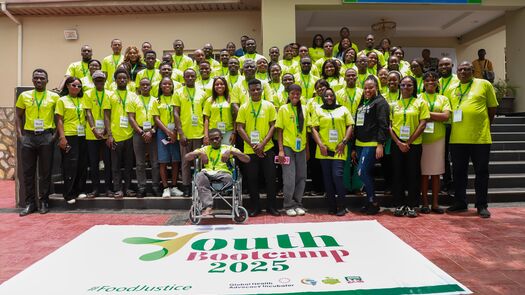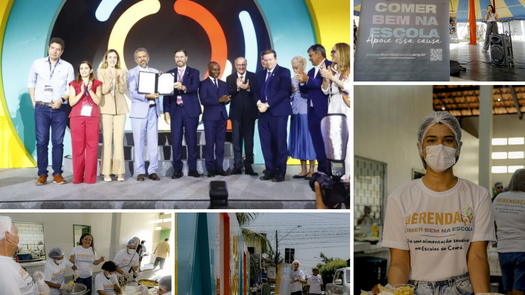November 25, 2025

Earlier this year, students, families, and health advocates celebrated a major legislative victory in Niterói, Brazil, with the passage of Law No. 3766/2023, which prohibits the sale, marketing, and distribution of products that contribute to childhood obesity in schools, including all ultra-processed products (UPPs). The policy, which was successfully advocated for by the Desiderata Institute, applies to 70,000 students from public and private schools and demonstrates Brazil’s continued global leadership in school food policy.
Frequent consumption of UPPs among youth is a growing issue in Brazil and a leading cause of rising childhood obesity rates. Currently, 30% of children supported by the public health system are overweight, and this rate is even higher in Niterói (37%). This has serious implications for increasing the likelihood of developing diet-related noncommunicable diseases (NCDs), such as diabetes, heart and respiratory disease, and certain cancers in adulthood. The Global Health Advocacy Incubator’s (GHAI) Food Policy Program tackles this public health issue by supporting partners including Desiderata Institute to protect children from these unhealthy products in public sector facilities, especially schools. The food and beverages available and marketed in schools contribute greatly to students’ overall health and the eating habits they form, making this an important target for diet-related NCD prevention.
The new law provides a legally codified definition of UPPs for the first time in the country, including qualifying ingredients, additives, production processes, and specific examples of products that should be prohibited. Among the list, products like soft drinks, candies, ultra-processed cakes and biscuits and seasonings with monosodium glutamate or sodium salts are included.
Desiderata Institute’s "Niterói says 'Yes' to a healthier childhood" advocacy campaign leveraged the city’s strong local pride to build grassroots support for the bill. They engaged directly with members of the city council to make them aware of this critical issue and connected with city residents and families in-person and over digital media to build support for protecting local students from the harms of UPPs. They circulated a petition that generated over 1,850 signatures and held an event to generate excitement around the proposed legislation. GHAI supported the Desiderata Institute by providing training on grassroots mobilization, holding meetings to discuss how to align communication efforts with their advocacy strategy and offering feedback on their communication pieces and actions.
The bill received unanimous support from the city council and was enacted in January 2023. According to Renata Couto, Executive Director of the Desiderata Institute, “This victory is an important step toward changing nutrition policies in Brazilian schools, especially because it takes into account private schools. The more local legislation of this type we have, the greater the pressure for regulation at the national level. Successful actions to promote healthy eating among children and adolescents can become important inspirations for change throughout Brazil and even in other countries - as has been the case with other Brazilian initiatives. Niterói is the first municipality in the state of Rio to adopt this type of ordinance, and we hope that soon other cities, including the capital, will follow this path to promote better nutrition policies for all students.”
The advocacy efforts in the city are now focused on the executive branch to implement and monitor the new law, as well as adapting communication pieces to talk about it with the school community. Because Niterói is a neighboring city of Rio de Janeiro, this victory has great potential to influence a similar bill under discussion there, as well as in other localities. Brazilian advocates are currently monitoring and promoting similar local and state bills throughout the country that aim to create a healthier school environment where UPP sales and marketing are restricted. GHAI will continue to work with its Brazilian partners on replicating and adapting the Niterói advocacy campaign in other municipalities to ensure a healthier future for all children.



